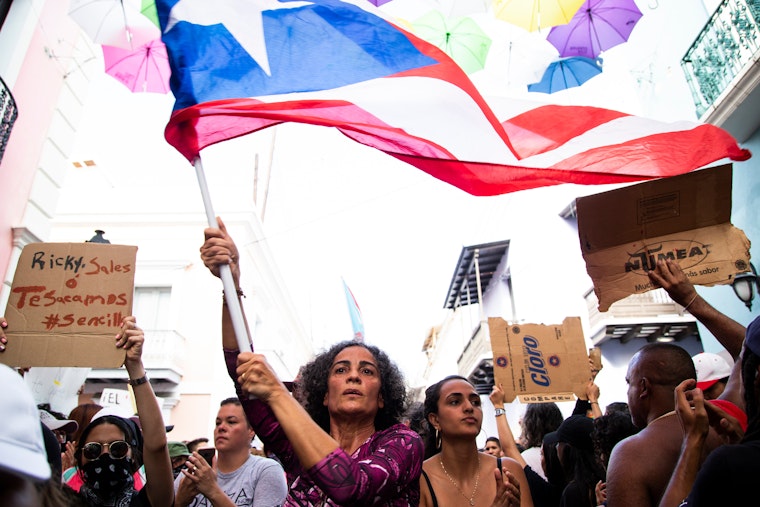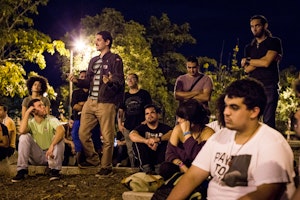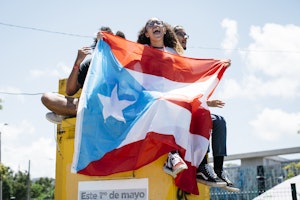“We’re More, and We’re Not Afraid”
By JorgeIván López Martínez & Luis J. Morales Ortiz

Two years after Hurricane Maria, Puerto Ricans have come a long way in charting their path towards a just recovery. They have done this by organizing their barrios, mobilizing collective resources, and pushing back against recovery efforts that prioritize the wealthy developers that want to take advantage of the island’s vulnerability with disaster capitalism strategies. This summer, thousands of Puerto Ricans mobilized to oust Governor Ricardo Rosselló—who was found to have not only misused public funds [in Spanish] post-Maria, but also laughed with his closest allies at people whose lives were lost after the storm. This movement was amplified largely in part by the presence of young and queer people of color who dared to take the streets—people who have been protesting for years now, pushing back against austerity measures, budget cuts to education, and the machista and homophobic violence that has taken the lives of over 40 women and queer people in the last two years. The Open Society Foundations’ Puerto Rico project is proud to support young people via our institutional and individual grant-making programs, and we are proud to share the voices of two of these youth who dared to say “presente” in the recent protests and who happen to be part of our first cohort of Puerto Rico Youth Fellows.
In a matter of days, Puerto Rico’s history changed forever. For years, Puerto Ricans were held down by U.S. colonialism, which kept us asleep. But we have awakened, and you now hear the roar of many, demanding justice for their islands. Reporters revealed private chat messages in which government officials conspired against the people of Puerto Rico. The disclosure of homophobic, transphobic, misogynist, and fat-phobic messages read on Telegram awakened our fellow Boricuas and spurred us to demand the immediate resignation of Puerto Rico Governor Ricardo “Ricky” Rosselló—who, with his words and those of his partners, offended virtually every single Boricua in one way or another.
For 14 days, masses of people mobilized in front of the Fortaleza, the San Juan mansion where the governor of Puerto Rico resides, to demand Rosselló’s resignation. The people of Puerto Rico united as one to proclaim #RickyResign, and, with total determination, began massive protests, forging a creative movement with telltale signs of revolution. With acrobats, motorcyclists, and kayakers demonstrating in the sky, on land, and in the sea, Boricuas were more than determined to change their destiny. Multiple initiatives emerged, such as “balls” organized by LGBTI communities, showcasing a variety of dances like bomba, plena, and even reggaeton—Puerto Rican cultural dances meant to demonstrate discontent. On the final night of protest, Boricuas embraced the #PerreoCombativo, named for reggaeton and dancing which took place on the night the governor resigned.
To understand what’s happening in Puerto Rico, it is important to keep in mind its history as an archipelago colonized for more than 500 years. Since the 1490s, Boricua folk have experienced plundering of its resources, violence from state institutions and the hardships that come from military and law enforcement control by forces far from the islands’ shores. In 1898, Spain lost the Spanish–American war, and the United States took possession of Puerto Rico, consolidating its imperial power through bloodshed and deadly force. As of 2016, the imposition of the Fiscal Control Board has deepened austerity measures, increased taxes on the islands’ citizens, destabilizing the retirement system, and dismantling the public education system, among other issues. This is why those of us protesting at the Fortaleza won’t stop with #RickyResign; we will continue to push to eliminate the Control Board and promote self-determination.
For days following the release of the private chats, Governor Rosselló asked the people of Puerto Rico for forgiveness and refused to resign his position. He used the police as a protective army to try to put down the protests, operating like a dictator. This was not a peaceful protest; blood was spilled. Police officers fired rubber bullets, assaulting demonstrators physically and verbally just for fun. As the days went by, they began firing with metal pellets and pellet grenades. People were shot in the face, attacked with tear gas and pepper spray. We fought with courage and art against the government’s violent response. Demonstrators received support from thousands of motorcyclists, people on horseback, and caravans that rode to Fortaleza, as well as by protests in multiple Puerto Rican towns and cities all over the world.
It has been inspiring to see people from the diaspora and around the world standing in solidarity with the people of Puerto Rico and denouncing government corruption and those responsible for the island’s debt. Many of the comments in Governor Rossello’s private chats involved sexist, racist, and homophobic remarks that echoed far beyond Puerto Rico’s shores. People all over the world have risen to demand an end to corruption and the diversion of public resources to the privileged class.
These great demonstrations were about far more than just removing one person from the governor’s mansion. They showed all Puerto Ricans demanding an end to the schemes of corruption that have predominated the past decades and have sunk many Puerto Rican generations into debt, and the rejection of behaviors that perpetuate discrimination and violence towards diverse people. As the nonbinary transfemme artist and activist María José puts it, “The future’s here. And the future is trans; it’s nonbinary; it’s black; it’s female; it’s fat; it rides a wheelchair; it’s deaf; it’s slutty; it’s immigrant; it’s empathetic; and it’s just. And if you’re not ready for the future to be that way: either you lock yourself up in your room to drown in your own venom, or you join our movement of love and justice for all.” We’re more, and we’re not afraid.
Luis J. Morales Ortiz and JorgeIván López Martínez are grantees of the Open Society Foundations.
JorgeIván López Martínez is a member of Open Society’s inaugural cohort of Puerto Rico Youth Fellows.
Luis J. Morales Ortiz is a member of Open Society’s inaugural cohort of Puerto Rico Youth Fellows.

